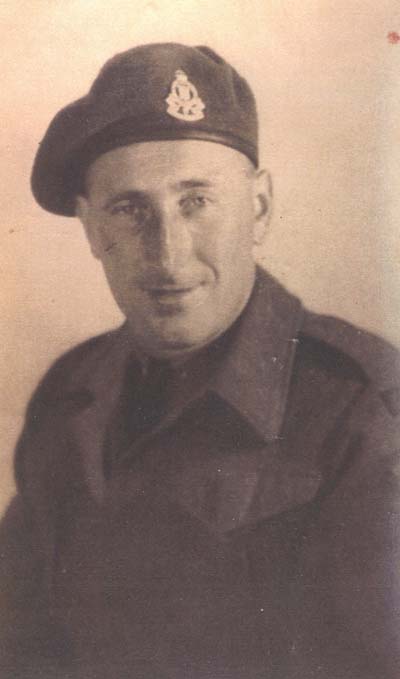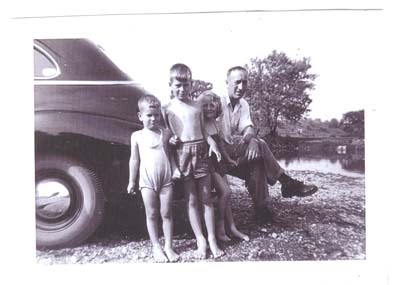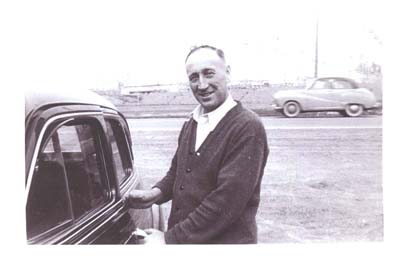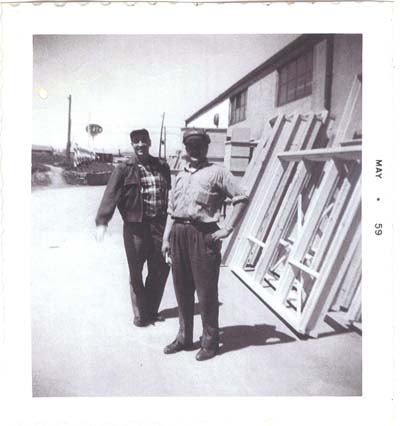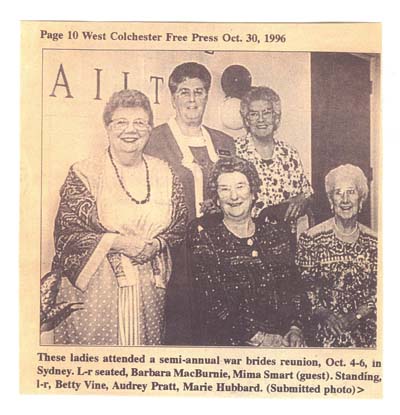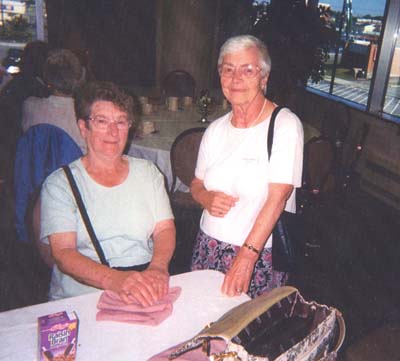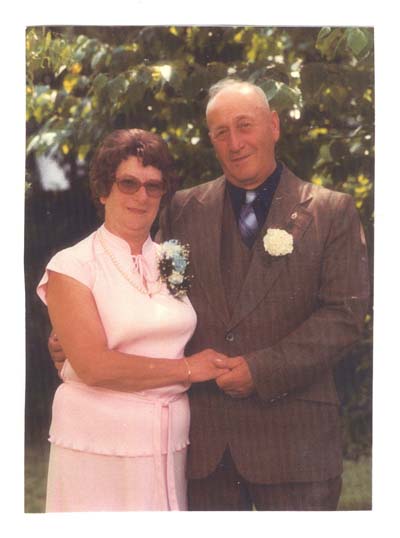Sobey Wall of Honour
Column
24
Row
22
Editor's Note: This account originally appeared in Betty Jean Barnhill's Canadian Studies 4400 project entitled: The Stories of Four English War Brides Who Adapted to Canada: How the War Bride Society Helped Them to Adapt. It is reproduced with the permission of the subject and Ms. Barnhill.
MR. AND MRS. GEORGE MACBURNIE:
This widowed War Bride, Mrs. Marjorie Barbara (nee Poole) MacBurnie, was interviewed Friday afternoon on January 25, 2002. She was born August 21, 1921 and brought up in Sherwood, Nottingham, where Robin Hood's legend and Nottingham Castle still exists. When the war broke out, she was working at Players Cigarette factory in Nottingham. However, in 1940 she became a member of the Land Army where one was working on the farms to grow produce. In 1942, she met her future husband, George Robert MacBurnie, at a dance. As did many Canadian soldiers, George MacBurnie, stayed in England until D-Day, 1944. He was with the Canadian Ordinance Corp. and drove trucks etc. during the war. Barb said that George stayed in England until after D-Day and the troops were more advanced in-land, however, he did go over to Europe and down to Italy until the war ended. Meanwhile, Barb had received some mail from George; but everything was kept quiet about war matters.
In any event, she had her papers filled out and the arrangements made for their wedding to be held at Nottingham's Anglican Church, on August 29, 1945. She used war coupons for her wedding dress and the reception was held at her parent's place.
At the end of the war, George MacBurnie was sent home before she was. Therefore, Barbara had to ge her papers filled out on her own and go to London to be processed as a War Bride.
Her father and grandfather accompanied her on the train to Southampton and stayed with her until she left for Canada on the Queen Mary. She described her trip as a fast one, being only five days; but she was too sea sick to enjoy much of the trip. She did, however, remember enjoying the white rolls served on the boat, and hearing Prime Minister Coolidge addressing the war brides. She remembers that she didn't feel very impressed with him. When asked what she noticed when she came to Canada, she replied that while passing Newfoundland, she noticed very remote tiny villages and she had hoped that she wasn't going to be in such a remote place. While she was sailing into Halifax harbour, however, she said that she was hoping someone would be there to meet her, as she began to feel the strangeness of the place and began to wonder what she was coming to. As it turned out, it was quite a culture shock for her and she described he first visit at her in-law's place. She was shocked that she had to go through a 'bed of Nettles' to get to an outside toilet! Also, the miles and miles of wooded area that they passed, while travelling on a mud road to get to their destination made her feel terribly unsettled. However, George rented a room in Truro, on Arthur Street and that helped her feel closer to home and the comforts to which she was more accustomed. She went on to explain that she did attend a couple of War Bride Association meetings; but once she started her family, there just wasn't the time to do that.
After the third child was born, the family left for Ontario to settle in Port Credit, which she described as a nice, quiet little village in which to raise the family. After the ninth child was born, they resettled in Truro, Nova Scotia. As she said, "you know what they say about a Maritimer." They had two more children after that. When the children got older, George joined the Legion and he and Barbara started getting out more. In 1969, he became the President and she began to go to the War Bride Association meeting again. Unlike a lot of the War Brides, she didn't get back to England until twenty-five years later, so the War Bride Association was the closest she could get for English entertainment and fellowship. She explained that Vera Lynn was her era and she was able to go back to her youth, by listening to her songs. While her parents never got over to Canada, her father wrote letters and the family sent biscuits and 'sweeties' to the kids. They loved to get those parcels.
While his wife, eleven children, 41 grandchildren and seven great grandchildren survived George, Barbara MacBurnie feels very blessed with her family and enjoys being a member of the War Brides Association, which gets together twice every year.
While looking at the picture stuck on her doors and her refrigerator, which her great grandchildren drew for their Great Nanny, both George and Barb must know by now how much they are loved. Their story is captured on tape for their children, grandchildren and great-grandchildren and future generations interested in hearing it at Pier 21.
The special Vera Lynn song dedicated to Barbara's husband is:
The White Cliffs of Dover
There'll be bluebirds over, the white cliffs of Dover,
There'll be love and laughter, and peace ever after,
Tomorrow, when the world is free.
The shepherd will tend his sheep; the valley will bloom again,
And Jimmy will go to sleep, in his own little room again.
There'll be bluebirds over, the white cliffs of Dover,
Tomorrow, just you wait and see.
In my conclusion, I hope to have illustrated how these War Brides adapted to Canada and contributed to our society through their love for each other, their loyalty to their country called Canada and their War Brides Association. I grew up in Belmont, Colchester Country, Nova Scotia, just four miles from the strategic World War II Debert Military Base Camp. My name is Betty Jean Barnhill and these are their stories. I hope their stories have captivated you and enlightened you, as they have me.
MRS. GEORGE MACBURNIE:
AN ENGLISH WAR BRIDE'S STORY
London's News Flash:
SEPTEMBER 3, 1939: WAR IS DECLARED!
Marjorie Barbara Poole was just eighteen, on the 21 of August, the year when World War II broke out. She was born and raised in Nottingham, England by her parents, Mr. And Mrs. Robert Poole. Although she began work at the huge Players Tobacco Factory in Nottingham at age sixteen, she joined the Land Army soon after the war broke out. She said:
"You had to do your part, you know."
When we talked a bit about the war years, Barbara said:
"It was awful hearing about the ships that were sunk by the Bismarck. All those Canadian soldiers were killed trying to get food and supplies overseas. There was a song out saying that, "We had to sink the Bismarck" I was a volunteer in the land Army, so I did my part ploughing and planting the field for a lot of food supplies.
1942 - 1944: When She Met George and They Fell In Love:
When asked when and where she met George, she replied:
"I met George at a dance hall in 1942. We were all young and everybody went to the dances back then. We did the ballroom dancing and the fox trots, not the country stuff we do today."
She went on to say:
"George was in the Ordinance Division of the Canadian Army. He drove the trucks with ammunition and supplies, stuff like that. He was born in Belmont, Nova Scotia and was the son of Robert and Ellen (Nellie) MacBurnie."
1944 - 1945: They Kept In Touch:
She said:
"George was sent overseas after D-Day to Africa, Italy and on up to Germany."
She didn't hear from him too much because you had to be very careful not to let anything get out. "When I did get letters, they weren't censored because he wrote stuff that was not about war efforts, so I didn't know where he was or anything."
1945: The War Ended and They Were Wed :
The Wedding Day
August 29, 1945
After the war ended, they were married in the Church of England in Nottingham, on August 29, 1945. She said:
"It was an overcast day, the day of my wedding, we had a small wedding. I had one girlfriend, Li Shelton, as my attendant and George had his friend, Bill, as his best man. I used war coupons to buy my wedding dress and our reception was held at my parents' place in Nottingham, England."
1946: Hubby Leaves for Canada, and Barbara Leaves Later:
After they were married, Barbara and George stayed in Nottingham until George left for Canada. Meanwhile, Barbara had to get her papers filled out and sent in. After she was processed in England as a War Bride, she went on to say:
"My father and Grandfather accompanied me on the train to Southampton and stayed with me until I left for Canada on the H.M.C.S. Queen Mary."
"I don't like boats and I was very seasick; but we all enjoyed the white rolls and the wonderful food that was served on the boat. We had a fast trip over. It was only five days in crossing. We had entertainment every night and Prime Minister Mackenzie King and his entourage were on our boat at the same time. He gave a speech to us War Brides but I wasn't very impressed with him."
1946: The Arrival and The Reality:
When asked what she noticed first when she came to Canada, she replied:
"I remember that while we were passing Newfoundland, I Noticed the remote, tiny villages and I had hoped that I wasn't going to such a remote place as that. While sailing into Halifax harbour, however, I remember thinking that I hoped someone would be there to meet me. I began to feel the strangeness of the place and began to wonder what I was coming to."
When Barbara described her strange, new place she said:
"It was quite a culture shock for me. I was used to England's cities and towns. I wasn't prepared for this life. Gee, the miles and miles of wooded area that we passed, while traveling on a mud road to get to my in-law's place to meet them. I felt terribly unsettled about everything. At my in-laws' place, they were very kind to me and everything but I even had to go through a bed of 'Nettles' to get to an outside toilet! I never even saw an outside toilet in England!"
1946 - 1950: Adjusting to A Strange World and the War
War Brides Association:
"George got us a room in Truro, on Arthur Street and that helped me feel closer to home and the comforts of what I was more accustomed to. The War Brides' Association had just started up and I went to a couple of meetings, but I started my family shortly after that and had no time to attend meetings."
1950's - 1960's: The Move to Port Credit and Life in Ontario:
Barbara went on to say:
"We moved to Port Credit, Ontario after the third kiddie was born."
When asked what Port Credit, Ontario was like to her, she described her new dwellings as:
"We loved it in Port Credit. It was a small village when we first went there. We even paid village taxes then, not like it is today. Gee. Today it is part of Toronto, you know. George got a job in construction and we had six more kiddies after that. We really enjoyed being in Port Credit but you know what they say about a Maritimers."
1960's: Returning to The Maritimes:
Barbara went on to say:
"We came back to Truro, Nova Scotia in '67.We had two more kiddies after that. I guess we couldn't get the tap off, once it got started."
When asked about their life in Truro, Nova Scotia, she replied:
"We never went anywhere much. How could you go? Who would look after all the kiddies? And I couldn't get used to the winters. We didn't have snow in England, so I didn't know how to play in the snow and skate and all that stuff."
When asked about her parents keeping in touch, she described the situation this way:
"Dad did most of the writing of the letters. We wrote quite often. We would get parcels from England, especially at Christmas time. We would get those lovely tins of biscuits. They were those Peak Freans' right from England. You couldn't get them over here until much later on. Oh, we loved those biscuits. And the 'sweeties' they would send the kiddies. They just loved them. You couldn't get the same candies here- not the same sweet taste."
1970's - 1980's: Time went on for the MacBurnie's and they Joined Clubs:
Barbara said:
"After the older ones got bigger and able to look after the smaller kiddies, George and I started to go the dances at the Legion. George became the President of the Legion, in 1969 and we went out a lot after that. When my oldest daughter was married in 1982, George and I had our picture taken together."
1985 - Present:
I went to the War Brides' Association here in Truro, and I really enjoy getting together with the girls. We are entertained by Vera Lynn. She was our era you know and she takes us back to our youth. After George passed away, I went to the meeting with the girls, at many different places. I enjoy getting together with the girls twice every year."
When asked about her life as a Canadian, her children and her future, she replied:
"George and I had eleven children, 41 grandchildren and we now have seven great-grandchildren. They all live around the Truro area, except for three. I have one son out West, one in Ontario and my daughter is in Windsor, Nova Scotia."
While looking around her kitchen and living room, I noticed a lot of pictures taped on the fridge and the doors of the room. When I commented about them, Barbara said:
"Oh yes, they love to draw and give their Great- nanny their pictures. I put them up all around."
Thanking Barbara for her time and her story, I left feeling very enriched by their legacy of their life and love for each other and their family.
